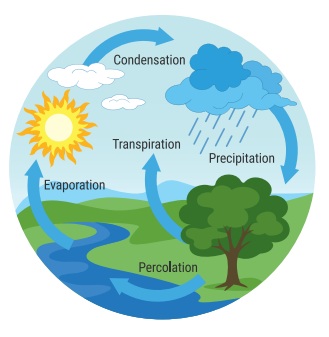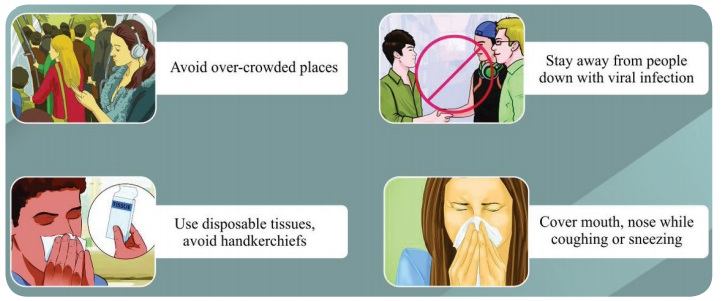Air | Term 3 Chapter 3 | 5th Science - Questions with Answers | 5th Science : Term 3 Unit 3 : Air
Chapter: 5th Science : Term 3 Unit 3 : Air
Questions with Answers
Air ( Term 3 Chapter 3 | 5th Science )
Evaluation
I. Choose the correct answer.
1.
Chlorofluorocarbon is used in
a) refrigerator
b) air conditioners
c) Both
d) None
Answer: c) Both
2.
Which of the following gas is released by automobiles?
a) Carbon monoxide
b) Oxygen
c) Hydrogen
d) Nitrogen
Answer: a) Carbon monoxide
3.
A wind mill is used to produce
a) chemical energy
b) mechanical energy
c) electric energy
d) All of these
Answer: c) electric energy
4.
Influenza is caused by
a) fungus
b) bacteria
c) virus
d) protozoa
Answer: c) virus
5.
Height of mesosphere which lies after troposphere is
a) 70 to 75 km
b) 75 to 80 km
c) 80 to 85 km
d) 85 to 90 km
Answer: b) 75 to 80 km
II. Fill in the blanks.
1. Second highest layer of Earth’s
atmosphere is Thermosphere.
2. Releasing substances like chemical
compounds into the atmosphere is known as Air Pollution.
3. Airborne diseases can be caused by Air
pollutant.
4. The ozone layer protects us
from the harmful UV rays coming from the sun.
5. Atmospheric nitrogen is used by plants as
nitrates.
III. Match the following.
1. Troposphere - Satellite
2. Stratosphere - Space craft
3. Exosphere - Ozone layer
4. Thermosphere - Meteors
5. Mesosphere - Weather change
Answer:
1. Troposphere - Weather change
2. Stratosphere - Ozone layer
3. Exosphere - Space craft
4. Thermosphere – Satellite
5. Mesosphere - Meteors
IV. Answer in brief.
1.
What are the different layers of atmosphere?
Atmosphere is divided into
five different layers. The layers from the bottom upwards are called Troposphere,
Stratosphere, Mesosphere, Thermosphere and Exosphere;
2.
What is air pollution?
The presence of harmful
substances in the air which can have an adverse effect on living beings and the
environment is called air pollution.
3.
Name some of the air borne diseases?
Air pollution causes
several respiratory and heart problems. Many people have died due to air
pollution. Air pollutants cause pneumonia and asthma in children
4.
What is global warming?
Air pollution results in
the accumulation of carbon dioxide in the atmosphere. When gases like carbon
dioxide are present in the atmosphere in large amount, they increase the
atmospheric temperature.
5.
Mention two ways of controlling air pollution.
1. Minimising the use of
automobiles.
2. Reducing the usage of fossil
fuels for burning.
V. Answer in detail.
1. List the importance of air.
Water Cycle: Water
vapour present in the air is important of the formation of water cycle. Water
from the water bodies such as rivers and oceans evaporates and becomes water
vapour.
This water vapour then
forms the clouds. These clouds move to the land and get cooled to give us the
rain. This movement of clouds is possible due to air.

Supplies Energy : We
breathe oxygen present in the air and it is supplied to the cells in our body.
Body cells bum the food molecules with the help of oxygen and produce energy.
With this energy we do all kinds of works.
Sound travels through air : We
hear many things from the surroundings and people hear what we speak. This is
possible due to air because sound needs a medium to travel. Sound travels from
the point of generation to the listener through air.
Useful for plants: Nitrogen
present in the air is useful for plants. The nitrogen in the atmosphere is
converted into easily absorbable nitrates by plants with the help of some
microbes. It is known as nitrogen fixation. These nitrates are useful for the
growth of plants. Also air is helpful for the pollination of plants.
Pollengrains travel from one plant to another plant through air. Thus cross pollination
is achieved with the help of air.
Transport : Movement of air is
called wind. This is helpful for the ships and boats to sail on the water.
Airplanes and helicopters travel though air.
Sports : Paragliding is the
recreational and competitive adventure sport of flying. In this sport pilot
sits in a harness suspended below a fabric wing. Hang gliding is also an air
sport or recreational activity in which a pilot flies a light, non-motorized
foot -launched air craft calld a hang glider. Paragliding and hang gliding are
possible with the help of air. Other sports like wind surfing, kite surfing and
sailing are also possible with the hep of air.
Parachutes and Hot air balloons : Parachutes and hot air balloons are used to land from above. In
case of emergency, people use parachutes and come down slowly and safely with
the help of air.
Wind energy : Air flows from a
region of high pressure to low pressure. This flow of air at high speed is
called wind. This wind is used to generate electric power with the help of
windmills.
2.
Explain any three airborne diseases.
Diphtheria, Whooping cough
and Tuberculosis are some of the common airborne disease caused by bacteria.
Diphtheria : It is caused by the
bacteria, Cornebacterium diphtheria. It generally affects the upper respiratory
tract (nose and throat) and causes fever, sore throat and chocking of air
passage.
Whooping Cough : Whooping
cough is caused by Bordetalla pertusis. It also affects the respiratory tract
and causes mild fever, severe cough ending in whoop.
Tuberculosis:
Tuberculosis is caused by the bacteria, Microbacterium tuberculosis. When we
breathe, the bacteria present in the air gets into the lungs and affect it.
Infected person has to be treated with anti-tubercular drugs for a period of 6
months to one year.
VI. Higher order Thinking Questions.
1.
If there is no atmosphere, what will be the condition of earth?
I. If there is no
atmosphere, what will be the condition of earth.
1. There will be no air to
breathe and there won't be any living things on earth.
2. There won't be rain or
water and earth will remain barren and dry.
3. The earth will be hit
by a shower of meteors.
4. The harmful rays of the
sun will reach the earth directly.
5. In the absence air
sound waves will not travel over earth. No sound will be audible.
2.
Give some suggestions to prevent air pollution.
We need to take some
measures to avoid air pollution. Some of them are discussed below.
❖ Major pollutants which cause air pollution come from
automobiles. Using public modes of transport can reduce the rate of pollution.
We also should encourage others to use public transport.
❖ By reducing the usage of fossil fuels for burning we can save the
environment.
❖ We can use non-renewable energy resources like solar energy and
wind energy instead pollution.
❖ We need to reduce our usage. We can reuse or recycle few items.
❖ Switch off fans and lights when you are not using them.
❖ CFL bulbs consume less electricity. By using these bulbs we can
save energy.
❖ Planting more trees can reduce the amount of carbon dioxide in
the atmosphere.
Activity 1
Read the weather news in a daily news paper and note down the changes in the weather over a week. In which layer these changes take place? Discuss in the classroom about these changes and record your points.
Activity 2
Find out the places where wind energy is produced. Also discuss about the importance of wind energy in the classroom and make a report on your discussion.
Activity 3
Organise a debate in your class about the advantages and disadvantages of industries. Discuss in what way industries are responsible for air pollution. Also discuss what measures can be taken to minimise air pollution caused by industries.
Activity 4
Find out the common air pollutants present in your area. Discuss about the effects of these pollutants. Record your observations in your note book.
Activity 5
Divide the students in the class into different groups and discuss how airborne diseases can be prevented.
